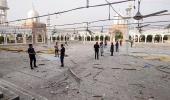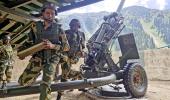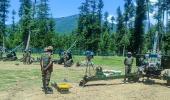'The devastating Indian Air Force strikes on the night of May 9-10 exposed Pakistan's vulnerabilities.'
'If these had continued, it would have further degraded Pakistan's ability to continue with air operations.'

In response to the April 22 Pahalgam terrorist attack, India launched Operation Sindoor with precision strikes on terror infrastructure inside Pakistan on May 7.
Pakistan then targeted civilian and military sites in India over more than three days, drawing retaliatory strikes on 13 Pakistani military installations.
On May 10 afternoon, Pakistan's director general of military operations called his Indian counterpart, after which both sides agreed to stop all military action from 5 pm IST.
With Operation Sindoor only suspended, Lieutenant General Deependra Singh Hooda (retd), the former General Officer Commanding-in-Chief of the Indian Army's Northern Command who held the position during the September 2016 surgical strike in retaliation to the Pakistan-backed Uri terrorist attack, speaks to Bhaswar Kumar/Business Standard about India's strategic messaging and the changing character of its conflict with Pakistan. The first of a two-part interview:
How would you assess India's management of the escalation ladder during Operation Sindoor?
As two adversaries climb the escalation ladder, they strive to achieve escalation domination in each stage. There were three broad phases of Operation Sindoor.
The first phase was the Indian strike on the night of May 6-7 targeting nine terrorist camps in Pakistan and Pakistan occupied Kashmir.
All these targets were successfully hit. The second phase began with Pakistan retaliating with drone and missile strikes.
These were again successfully countered by India's air defence network and caused minimal damage. The third phase was the Indian precision strikes on Pakistan's air force infrastructure, including airfields, air defence units, and control networks.
This was a devastating blow and resulted in Pakistan appealing for a ceasefire.
I would, therefore, assess that India managed to achieve escalation domination at every stage of the operation.
Countries have responded to terror attacks with long-drawn-out wars causing significant civilian casualties.
There has been a perception in the West that the War on Terror was ultimately wasteful and disproportionate.
How do you view India's response to Pahalgam in that context?
The West's War on Terror was mainly against non-State actors and did not have clear political objectives. That is why it turned into a very long war with no specific end in sight.
Operation Sindoor had clearly defined objectives -- to target terrorist leaders in Pakistan to send a decisive signal that terrorism would face a strong conventional military response.
At the same time, India signalled that the onus of escalation was on Pakistan by describing the initial strike as 'focused, measured, and non-escalatory'.
India's clear strategic messaging was also one reason that the crisis was quickly resolved.
Was Operation Sindoor -- from striking terror camps to Pakistan's military sites -- still below the nuclear threshold, or has it set a new bar?
For some time now, India has been saying that Pakistan's nuclear blackmail has run its course and that waving the nuclear card in an India-Pakistan crisis will not deter New Delhi from exercising its right to the use of military force if attacked by terrorists backed by Pakistan.
Operation Sindoor has certainly set a new benchmark, but I also think that fears of a nuclear holocaust in South Asia are overblown.
Pakistan may appear irrational, but it is also not so self-destructive that it would leave the country in ruins.
Operation Sindoor has only been suspended, with the government calling it a new doctrine -- one where terror backers will also be targeted, undeterred by nuclear blackmail.
How would you explain what's changed from before?
This signifies a new paradigm in India's strategic thinking of how to deal with Pakistan.
There is now no low-cost option with Rawalpindi to continue using proxies to target India while shielding its military force.
The backers of terrorism are clearly the Pakistan army's leadership, and they will have to weigh the cost of a direct engagement with the Indian military if they persist with using terrorism as an instrument of State policy against India.
Why do you think India agreed to Pakistan's request to halt military activity, and how do you see the timing of the pause in the operation?
The devastating Indian Air Force strikes on the night of May 9-10 exposed Pakistan's vulnerabilities.
If these had continued, it would have further degraded Pakistan's ability to continue with air operations.
And it was in the air that all the action was going on. This was a major reason for Pakistan appealing for a ceasefire.
India had maintained escalation dominance and achieved its objectives; therefore, it had no reason to continue military operations.
- Part 2 of the Interview: 'Rein In Terrorism Or Face India's Military Strikes'
Feature Presentation: Aslam Hunani/Rediff











